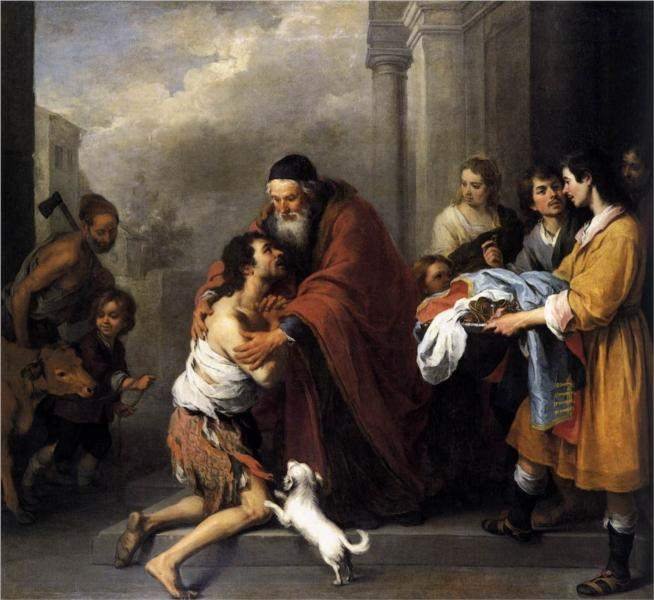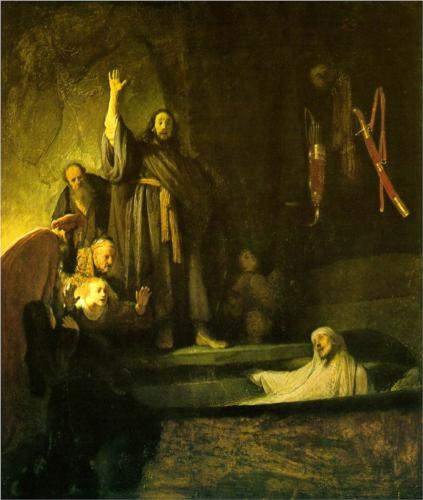[NOTE: This is not to be confused with Substitutiary Locomotion.]
I suppose it’s time to raise my blowhole for a few moments.

The Crucifixion (ca. 1311), by Giotto (WikiPaintings).
It’s been a hard few weeks, with yet another ugly head rising from the stump of my thesis, just as soon as I thought I’d dealt the death blow. I pray, once again, that I nearly have the thing where I want it and can push to the end very soon. And I’ve been stressed out and struggling and grouchy and in a foul mood, so I apologize to anyone with whom I’ve gotten into an argument recently. And I’ve been staying away from the blogosphere the past week or so, probably to the benefit of getting work done.
I know I still have the series on Baptism on the stove, and the one on Indulgences. Please bear with me. I hope I’ll be able to serve up something worthwhile whenever I have time.
The past week or so there’s been something else on my mind that I wanted to write about, though I have the time neither to research it properly nor write it up fully right now. It’s this debacle recently in the Presbyterian Church (U.S.A.), the more mainline, liberal denomination of American Presbyterians, over removal of the modern hymn “In Christ Alone” from their new hymnal — allegedly over an objection to its reference to the “wrath of God,” though now the Presbyterians are saying that the offense was instead because of the reference to God’s wrath being “satisfied,” implying the satisfaction theory of atonement, which, I was surprised to learn, they reject (contrary to historic Presbyterian doctrine).
The offending lyric:
Till on that cross as Jesus died,
The wrath of God was satisfied;
For ev’ry sin on Him was laid—
Here in the death of Christ I live.
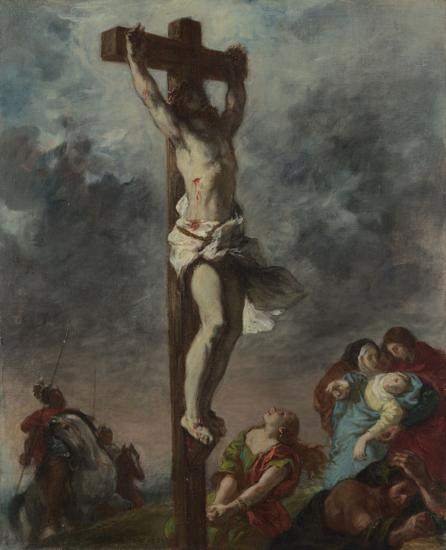
Christ on the Cross (1853), by Eugene Delacroix (WikiPaintings).
The truth is, I must confess, I’ve never understood the differences between the various theories of the atonement — neither how they differed from one another, or what the big deal was. I had heard, vaguely, that the Reformed and Evangelicals adhere to the doctrine of penal substitution; while I’d heard that we Catholics did not. But it seemed to me that in this, as in many other areas of doctrine, differing opinions might be compatible with one another and weren’t necessarily contradictory. Christ’s Crucifixion, Death, and Resurrection are the pivotal events of all history; can’t they have done more than one thing, or be validly understood more than one way? Can their mystery even really be comprehended fully by human understanding?
After all, don’t we all believe that Christ died to atone for our sins? Does Scripture not clearly say that Jesus is the propitiation for our sins — not just ours, but those of the whole world (1 John 2:2)? That God presented Christ as a sacrifice of atonement through the shedding of His Blood (Romans 3:25)? Yes, but beyond this, a number of understandings of the Atonement — why Christ died for our sins and how the propiation of our sins is accomplished — have been put forward. It’s here that the theological poverty of my upbringing really shows: I had never even heard of this until I began reading deeply into Reformed theology last year. (Thanks to Resting in His Grace for calling the matter to my attention this time around.)
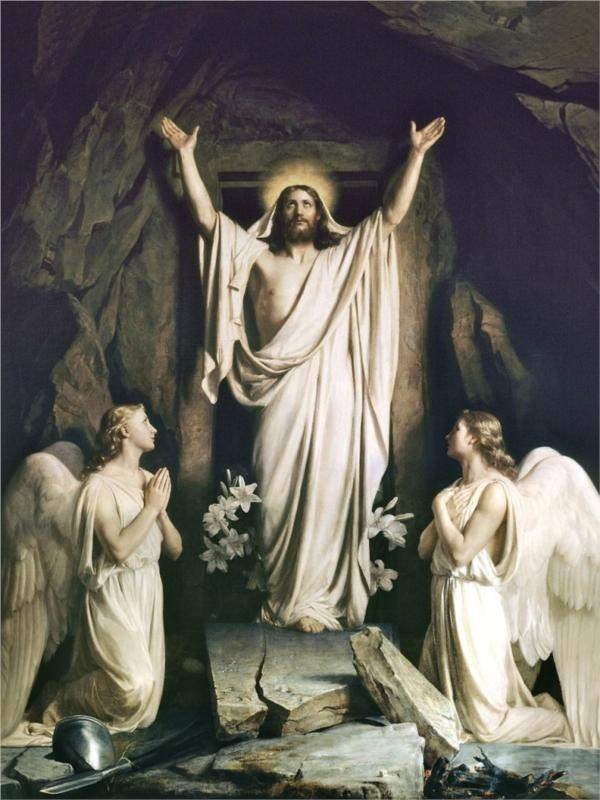
The Resurrection of Christ (1875), by Carl Bloch (WikiPaintings)
It is certainly true, as I suspected, that the Christus Victor understanding of Christ’s Death and Resurrection — that Christ conquered death, hell, and the grave (cf. Revelation 20:13–14) — was perfectly scriptural and in no way opposed to the idea, also perfectly scriptural, that Christ died in atonement for our sins (Romans 5:11). But it’s with this idea of atonement proper — how Jesus’s death atones for our sins — about which we have disagreements — in how to interpret Scripture. And these disagreements are compounded by confusion, by appeals and false appeals to the Early Church, by Reformed proponents finding antecedents of their view in Anselm or whomever, and Catholic scholars rejecting such suggestions, with the result that it’s unclear to me who was teaching what or when.
Even as an Evangelical, I didn’t understand this idea of penal substitution. But it truly pervades the Evangelical understanding. I took for granted growing up that Jesus “paid the price for our sins” and “died for our sins so we wouldn’t have to” — and have even thoughtlessly used such language as a Catholic. But the more I read about this doctrine, and learn what it truly rests on, the less I like it. What seemed on the surface to be hair-splitting nuance reflects a much deeper and more troubling misunderstanding of the love and mercy of God.
Bryan Cross has, as usual, a splendid and piercing exposition on the differences between the Catholic and Reformed conceptions of the Atonement. And I begin to understand what is meant by the statement that “as Jesus died, the wrath of God was satisfied.” In the understanding of Penal Substitution, God the Father punished Christ the Son for all the sins of humanity. Christ literally bore the penalty (poena) for our sins, the penalty we would otherwise suffer. God poured out His wrath, the wrath of judgment on sinners, on Christ the spotless lamb, who knew no sin.
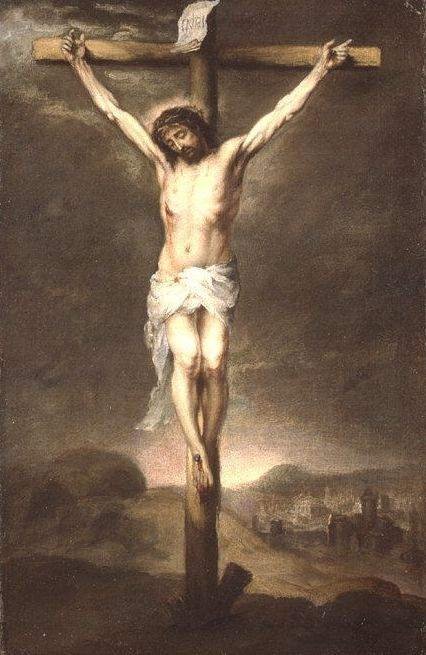
Christ on the Cross (1665), by Bartolomé Esteban Murillo (WikiPaintings)
Now, Bryan can give this matter much greater theological clarity and detail; what I offer is my gut reaction. I have always been troubled, even as an Evangelical, by the image of “sinners in the hands of an angry God” put forward by Jonathan Edwards — God as an angry, wrath-filled deity, ravenous to punish sinners. Certainly our loving and merciful God, who sent His only Son that we might be saved, does not want to punish sinners. Certainly He has no pleasure in the death of the wicked, but desires that he turn from his way and live (Ezekiel 33:11). So it seems utterly foreign to the idea of a loving God that He would punish His own Son. In my conception, even as an evangelical, Christ willingly bore our sins, was wounded for our transgressions — but it wasn’t God punishing Him so much as Christ giving Himself up for us. I can find nothing in Scripture to support the view of a wrathful God punishing an innocent Christ. Certainly God’s wrath is reserved for the wicked on the Day of their judgment (cf. Revelation 19:15); and certainly that wrath will not now be turned upon those of us who are saved in Christ Jesus. But the idea of God punishing Christ with our penalty, such that his wrath is satisfied, has an even deeper consequence that I never understood before.
It’s from this that the Reformed and Evangelicals receive their misunderstanding that “salvation” is a one-time thing, that when they have faith in Christ, they are “saved” and their sins are “covered” — not just their past sins, but every sin they will ever commit. Because Christ, in addition to atoning for our sins, purchasing our pardon (what we would call the ransom theory of atonement), paid the penalty that was meant for us, for all our sins forever — such that there is no more penalty left for us to pay. He has already suffered the penalty for any sin we could ever commit, so we will never have to suffer any penalty — ergo, all our sins are effectively already forgiven.
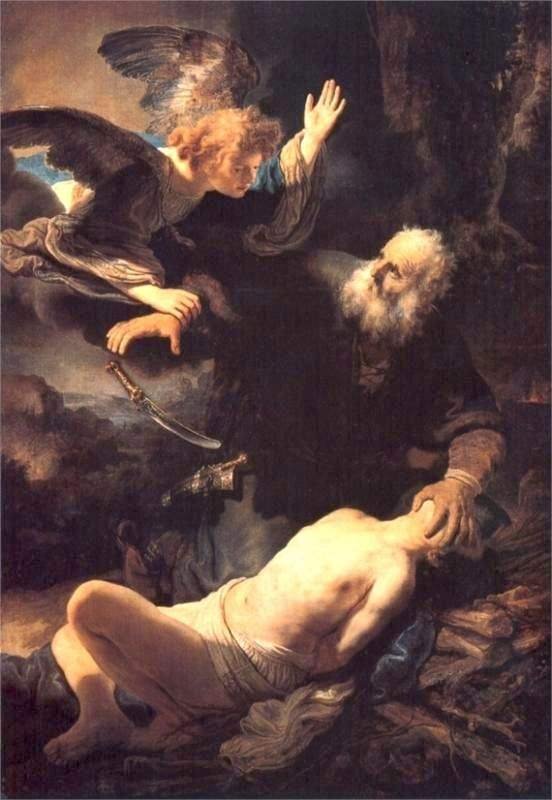
The Sacrifice of Abraham (1635), Rembrandt (WikiPaintings).
There is a fine nuance here: Certainly, we Catholics agree, Christ died to atone for all our sins, ever, for all time — even the sins we had not yet committed — since temporally, all of us sinners had not even been born yet, let alone committed any sins; and His mercy will still be there for many more generations of sinners after we die. We are redeemed — bought with a price — before we are born, before we sin — but we are not forgiven until we present ourselves repentant. There is certainly a limitless flow of the mercy and grace Christ bought for us, to forgive our every sin for all time; but rather than Christ paying a penalty that we will now never have to pay, He bought our redemption, to unshackle us from sin and death, when He calls us to Him to receive it.
I’m giving myself a headache. There is a whole lot more of this where it came from, and another deep hole of theology to fall into.







